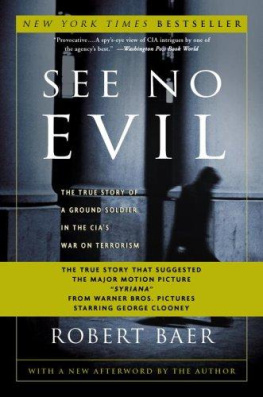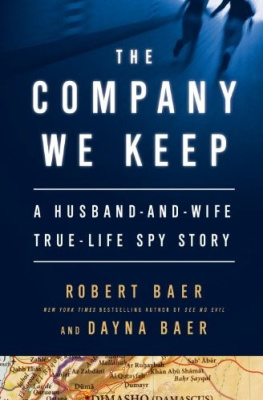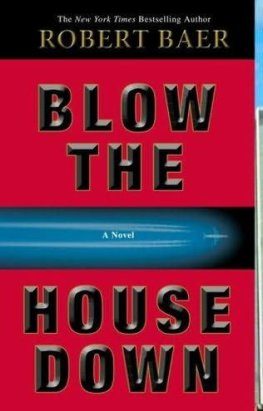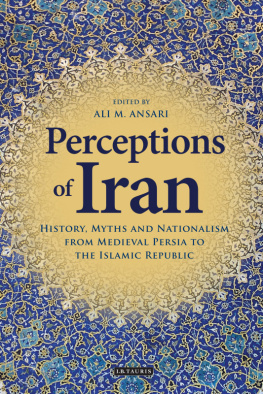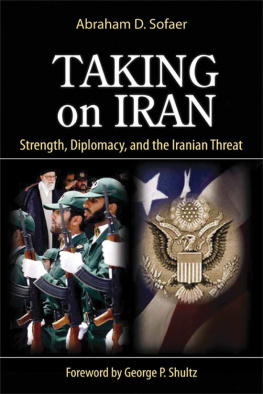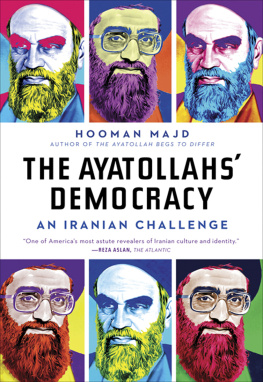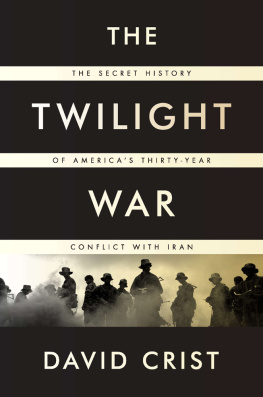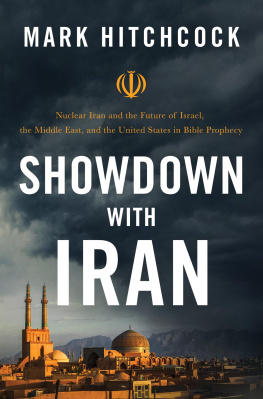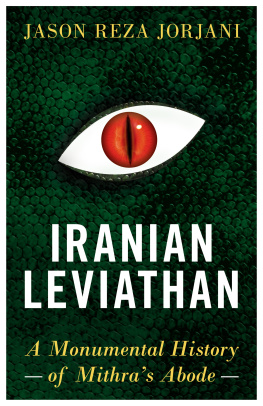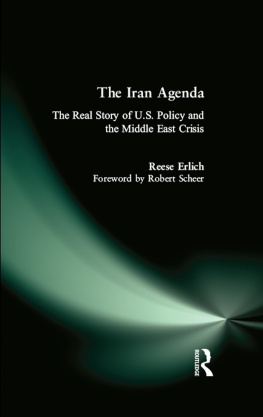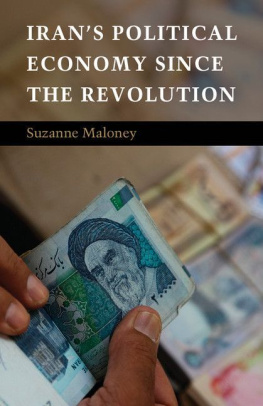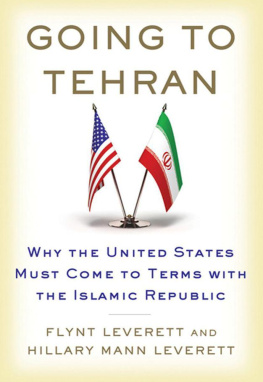Robert Baer
The Devil We Know
Table of Contents
THE MASTER PLAN: HOW IRAN ARRIVED AT ITS SECRET BLUEPRINT FOR EMPIRE
FROM TERRORISM TO POWER POLITICS: HOW IRAN BECAME A STATIST POWER
SEIZING THE WORLDS ENERGY CORRIDORS: WHY IRAN WILL SHORTLY CONTROL THE MOST VITAL OIL AND GAS TRADE ROUTES
WHITE KNIGHTS: HOW IRANS SHIA ARE WINNING THE HEARTS OF THE SUNNI PALESTINIANS
ULTIMATE SACRIFICE: MARTYRS, SUICIDE BOMBERS, AND THE FIGHT FOR THE SOUL OF ISLAM
____________________
THE DEVIL WE KNOW
PROLOGUE
____________________
I first visited Iran in October 1978, only months before Ayatollah Khomeini would return from exile and take power. I was twenty-four, on my way to my first CIA posting, in India, and had only the vaguest ideas about the Middle East.
The kamikaze taxi driver who drove me into Tehran from the air-port that night taught me my first lesson: Iranians cant drive. The way he swooped and darted between the army patrols, I was convinced he was trying to draw fire. And was it legal to drive down the sidewalk to get around traffic? My one-week stopover in Tehran did little to clear things up. I left not having the slightest idea what Khomeini would do with the mess when it was his. As Id find out much later, Khomeini didnt know either.
Less than four years later, Iran was at war with the United States. On Tehrans part it was undeclared; on Washingtons, it was ignored. In the middle of the Cold War, who had time for Tehrans idiosyncratic, possibly insane mullahs?
I served on the front lines of that war, declared or undeclared. I lost colleagues at the American embassy in Beirut, which Iran truck-bombed in April 1983. I lost Iranian friends assassinated by the regime. Like many, I was convinced that Irans revolution would drown in its own blood, the revolutionary zeal draining out just as it had with other violent rebellions in Islam. This seemed all but certain during the Iran-Iraq War, when Khomeini stubbornly refused to settle with Saddam Hussein, sacrificing hundreds of thousands of Iranians for no other reason than that he believed God was on his side. But Khomeinis regime survived, providing another lesson I needed to learn before Iran would come into focus for me.
At the end of the Iran-Iraq War, not only did Iran still have fight in it, it was a lot smarter. Iran and its proxy in Lebanon, Hezbollah, found out they could win by discarding terrorism for a radically new form of guerrilla warfare: roadside bombs, sophisticated precision-guided rockets, and the ultimate smart bomb, the suicide bomber. These are the same weapons and tactics that now have us stalemated in Iraq and Afghanistan. And along the way Iran just as certainly acquired an appetite for hegemony, a belief that its powerful enough to challenge the United States for dominance of the Persian Gulf not just control of Iraq but of the Gulfs oil, which is 55 percent of the worlds reserves.
This isnt a war the United States has years to prepare for. Its half-fought and already half-won by Iran. The sooner we understand the Iranian paradox who they are, what they want, how they want to both humble us and work with us the sooner well understand how to come to terms with the new Iranian superpower.
Twenty-six years after that first visit, I was in Tehran again. This time I was making a documentary with Britains Channel 4 and an Irish production company. In April 2005, I attended the Liberation of Khorramshahr celebration held at Ayatollah Khomeinis mausoleum not far from Tehran. Outside after the ceremony, I caught up with Irans hard-line chief of staff. I asked him what the importance of martyrdom was for Irans armed forces.
He was surprised to be questioned by an American, especially in a place foreigners rarely visit. But he answered anyhow.
In all religions martyrdom exists, he told me. Even in Ireland there are martyrs. Anyone who lives and fights for peace, unity, human rights is a martyr. And if his blood is shed, he is considered a martyr. In Islam, martyrdom is the reward for holy war and whoever is with pure motive and knowingly gives his life, he sees the face of God. He will be received by the angels, who will take him to his paradise.
Of course. This could have been lifted right out of the Koran, the same religious propaganda weve been subjected to for so long. But what did it mean in practical terms to America? I asked.
America should have understood by now that day by day they have to listen more carefully, he said. They should know that no army can stand in the way of martyrdom. The Islamic revolution has reached a point where it has access to modern weapons and the experience to plan and carry out its strategy. America should understand that if it takes on Iran today, it will lose its position of strength.
I knew Iran well enough now to know what its chief of staff was getting at. Iran has convinced itself it is Americas equal, a statist military power capable of thwarting American power in the Gulf. Iran believes that the new form of warfare it developed in Lebanon can fight a conventional army to a standstill. Iran also believes it is now a global power, inasmuch as its advanced Silkworm missiles positioned along the Persian Gulf can shut off Gulf oil exports in a matter of minutes. The chief of staffs message was clear: The game has changed.
When Americans think about Iran, we see the black-turbaned, long-bearded, scowling Ayatollah Khomeini, a dark specter bent on vengeance. Or we remember young Iranian boys running across Iraqi minefields screaming allahu akbar, God is great. Or the American diplomats in 1979, blindfolded, hands tied behind their backs. Its nearly impossible to get past those images. And Irans apocalyptic, Holocaust-denying president, Mahmoud Ahmadinejad, hasnt helped.
We have convinced ourselves that Iran is a historical aberration, a medieval throwback harboring an irrational hate for the West. Iranians are Islamofascists, weve been told, to be lumped in with Osama bin Laden and al Qaeda. And somewhere along the way, weve settled for the easy assumption that the Iranian regime will one day, inevitably, collapse under the weight of the twenty-first century. All we have to do in the meantime is make sure it doesnt get a nuclear bomb, and that its proxy Hezbollah, the Lebanese Shia political and military organization, stops rocketing Israel.
Iran is a closed society and a remote enemy. Its not surprising, then, that the United States missed how Iran has evolved over the last thirty years how it has modernized, grown up, having abandoned both terrorism and Khomeinis revolution. Iran is still riding the wave of Islamic fundamentalism thats sweeping away the last vestiges of a secular Middle East, but at the same time its now a rational actor, coldly and methodically pursuing its national interests.
Scratch away the veneer of Islam, and what you find in an Iranian is old-fashioned nationalism a deep, abiding defiance of colonialism. Keep scratching and what you find at the bottom of Irans soul is a newfound taste for empire. It runs through Iranian society, even among more secular Iranians. But Iran isnt a new Rome, intent on naked conquest, cultural diffusion, settlements, and religious conversion. What drives Iran to empire is something different. Call it destiny, entitlement, or even manifest destiny: whats critical to understand is that Iran today has an unshakable belief in its right to empire. It means to achieve this through proxy warfare and control over oil supplies.
Its not hard to understand where Iran got the confidence, misplaced or not, that it can beat the West. In Lebanon, from 1982 to 2000, Irans proxy Hezbollah beat the Israelis on the field of battle, the first time Israels army had lost since the countrys founding in 1948. Israel claims it wasnt defeated militarily in the conflict, that they lost only the will to fight and not the war. But in the 34-day Lebanon war in 2006, the Israeli army was in fact beaten. It retreated from Lebanon with heavy losses and without obtaining a single objective.

